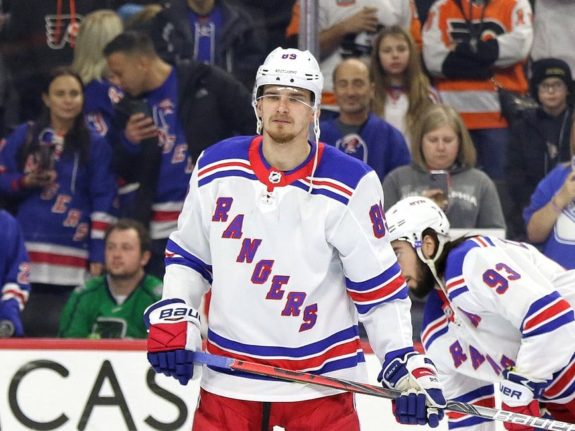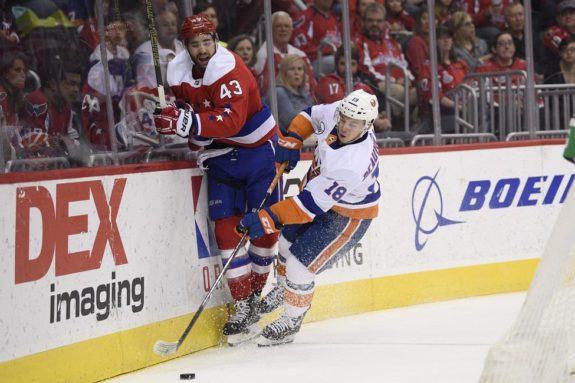With the NHL’s expansion draft now over, the Montreal Canadiens’ rumor mills have momentarily halted from spinning at full speed and some minor roster clarity is taking shape. Vast changes are still required to fill several potential vacancies. One option to gain valuable assets would be to consider sending offer sheets to pending restricted free agents (RFAs). Why target RFAs you may ask?
Well, it has been widely reported that forwards Phillip Danault and Tomas Tatar will likely not return to the team, which will challenge the team’s depth. On the positive end of the spectrum, Jonathan Drouin is expected to return next season after taking a long leave of absence due to personal reasons. In addition, Joel Armia (protected in expansion) is expected to sign an extension, along with fellow Finnish RFA teammates Jesperi Kotkaniemi and Artturi Lehkonen.
However, nothing is set in stone regarding other potential departures, including Eric Staal, Erik Gustafsson, and Jon Merrill. On Thursday, general manager Marc Bergevin stated that he would like to re-sign Corey Perry, mirroring Perry’s comments in his postseason media availability. Finally, it has been announced that Shea Weber will not return next season and will possibly be unable to continue his career at all. Needless to say, the Canadiens have several spots to fill and several millions of dollars to work with. Bergevin and the Canadiens should look beyond the standard version of free agency and consider targeting RFAs.
The Cap Situation
The Canadiens cap situation leading into the 2021-22 season does lend itself to bold moves and proposals. Montreal currently has $14.07 million in cap space, including Weber’s $7.857 million cap hit. It should be noted that teams are able to exceed the cap by 10 percent during the offseason. They have until the end of training camp to fully comply with the upper cap limit. With it entirely expected that Weber will be placed on long-term injury reserve (LTIR) when the season begins, the Canadiens should have more room to maneuver. In light of this potential cap space, here are some candidates the Canadiens should consider sending an offer sheet.
Too Late for Pavel Buchnevich
The New York Rangers have traded Pavel Buchnevich to the St. Louis Blues for Sammy Blais and a second-round draft pick. I had listed him prior to the trade as the number one offer sheet option solely based on the belief that this offer sheet would have the highest likelihood of working. The line of thinking went like this: the Rangers simply have too many high-end players to re-sign next season, including Norris Trophy winner Adam Fox, and forwards Mika Zibanejad and Ryan Strome. In addition, the Rangers are still rumored to be pushing for Buffalo Sabres star Jack Eichel, even since some bumps in the road have occurred with negotiations.

In any case, the Canadiens need to seek out options such as this where there are clear clashing points between a player and his team’s ability to retain him. In Buchnevich’s case, the previous contract was a 2-year, $3.25 million deal. Only a minor raise would be expected to the point where the Canadiens could make an offer their counterpart could not match while simultaneously keeping their own cap structure intact. Consider the case of Buchnevich (prior to the trade) as a case study for which players to target for offer sheets. That said, other, more expensive, and bold options do remain.
Adam Pelech
Adam Pelech is an underrated but elite shutdown defenceman who has shown a strong ability in limiting the offense of some of the best players in the NHL. As a member of the New York Islanders, he has helped lift his team to back-to-back conference finals/semifinals and did so playing around 23 minutes a night. He fits the makeup of the Canadiens blue line as a 6-foot-3, 205-pound defender with skating ability, physicality, and long reach. Furthermore, Pelech has played in a system that is fairly similar to the Canadiens: a defensive-first-minded team that frustrates opponents and uses strong transition to counterattack. Finally, Pelech is only 26 years old and should have years of good hockey ahead of him. He is one of many good options to help replace Weber.

Admittedly, it will be difficult to pry Pelech from the Islanders, who value the defenseman highly. In order to entice Pelech to sign an offer sheet, Bergevin would likely have to offer upward of $6 million a season on a longer-term deal—most likely something similar to Jeff Petry’s $6.25 million per year. The compensation for such an offer would require the Canadiens to relinquish first and third-round draft picks if precisely between $4,110,733 – $6,166,096 or first, second, and third-round picks if between $6,166,097 – $8,221,463.
The criticism of this sort of deal will likely land on Pelech’s low offensive numbers. He has only once scored five goals and has once exceeded 20 points in a season. Moreover, Pelech is a left-handed defenseman. The Canadiens have needed one for a while, but with Weber gone indefinitely, the focus has shifted to right-handed defensemen. Finally, the Islanders have even more cap space than the Canadiens currently ($17.67 million) and would likely match any deal offered. As a result, many may see an attempt like this as pointless. Regardless of public opinion, Bergevin has shown he can be bold when constructing his team. Using an offer sheet to acquire Pelech would fit the Bergy modus operandi.
Anthony Beauvillier
Not to pick on the Islanders, but in my mind, a top RFA target for the Canadiens should be Anthony Beauvillier. For a young player, he too could seamlessly fit the mold of the Canadiens as they transition into a team led by youth. Beauvillier plays a strong two-way game built on immense speed and would be an effective replacement for Tatar on the left wing. In his career, Beauvillier has amassed 155 points in 333 regular-season games.

The upside of this deal is the asking price would likely be lower than Pelech. Still, though, it would most likely have to land somewhere near $5 million a season for the Islanders to consider not matching. Even at that price tag, they could still match if they wanted to. One variable is that Islanders general manager Lou Lamoriello is known for being a difficult negotiator and this could hypothetically lead him to simply walking away from Beauvillier. A second variable, which is totally speculative, is the Quebec connection. Would Beauvillier be tempted to sign an offer sheet in order to play in his home province? It is difficult to know, but it is possible.
Regardless of who could be a target for an offer sheet, it should always be remembered that the player too would need to sign the deal. In other words, it takes two to tango and there is no guaranteeing that the target of an offer sheet would be interested in signing with the Canadiens. In any case, the Canadiens should consider this option as each of these players would help the team. Any offer sheets extended and signed have the potential to be matched within seven days. Let’s see what happens.